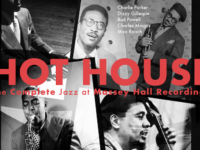To Canadians, as the new 2012 liner notes to this historic meeting of the jazz minds so rightly notes, Massey Hall is a building. To fans of this music worldwide, it’s something else — not a place, nearly 3,000 seats large, that has played host to literally thousands of concerts over a stirring 118-year history.
No, it’s a thing that happened: Massey Hall. Dizzy Gillespie and Charlie Parker, the yin-and-yang originators of bebop, on stage together for the last time. Bud Powell, Max Roach and Charles Mingus, there as well. And almost by chance — all of it.
The one-off date for a band only later dubbed, simply, “The Quintet” was organized by a gumption-filled group of Canadian jazz enthusiasts, held without benefit of a series of warm up dates, recorded through a single stage mic to a borrowed Ampex tape recording on a whim by Charles Mingus (who was only there when first-pick Oscar Pettiford couldn’t make it) — and then over and done with inside of an hour, over two sets in Toronto 59 years ago this month.
Jazz at Massey Hall, set for reissue on May 15, 2012 through the Concord Music Group, was initially released on the Mingus-Roach label Debut, and benefited greatly (or as much as it could) from a late-1980s digital redo by OJC. Yet another spit-shining by way of 24-bit remastering by Joe Tarantino makes it ever more clear that Mingus later overdubbed some of his own parts: The bass-playing perfectionist practically drowns out Parker on the otherwise brilliant “Hot House.”
There is also the expected sloppiness associated with these kind of thrown-together all-star outings. The story has always gone that Gillespie, a boxing fan, was stealing away during the show for updates on the ongoing fight between Rocky Marciano and Jersey Joe Walcott. Ashley Kahn, author of Kind of Blue: The Making of the Miles Davis Masterpiece, reveals in the new notes that the band actually took a 45-minute break so fight fans could see Walcott fall, just over two minutes into the first round.
That said, you feel compelled to forgive the moments when this group suffers a misstep. First, because they don’t happen all that often. Second, because any other amalgam of players likely would have suffered more of them.
What you hear, more often than not, is a furious cry against the dying of the light around bebop, with a series of players in their mid-20s to mid-30s clashing head on with their own past — the set was dominated by big hits from as earlier era, including “Salt Peanuts,” “Perdido” and “A Night in Tunisia” — not to mention the restless imagination of Mingus, who was still rounding into shape as a visionary leader.
Along the way, an album first presented as tribute, but then forged through staggering adversity, becomes an opportunity for re-examination.
Forget that they were, save for the West Coast-leaning Mingus, a group so closely associated with bop as to stand as its Mount Jazz-more. The framework of legend had already hardened for Parker as the doomed genius, Gillespie as the clown prince, Powell as the standard bearer and Roach as the rhythm colossus. It’s clear, though, in this album’s moments of deepest intimacy, that they weren’t ready for the embalming fluid just yet — in particular, it seems to me, Bird.
Parker — referred to as “Charlie Chan,” in honor of his live-in lover, on the original album sleeve because of contract issues — had begun by launching Duke Ellington’s “Perdido” into the stratosphere, stepping through a series of dramatic interpolations with an ease that belies his eventual fate. Then play close attention to Bird’s almost scolding presence in the traditional mid-1940s send-up “Salt Peanuts.” Parker sets the tone by introducing Dizzy, more than a little condescendingly, as “my worthy constituent.”
Elsewhere, the set seems to underscore Gillespie’s unquestioned place in the canon with pieces like “A Night in Tunisia,” but it is Parker who best acquits himself — displaying both wit and then lusty verve. With Dizzy yelping praise and encouragement, for instance, Bird eventually takes over the uptempo blues “Wee.”
This record, as much as any other from the period, makes the case for Parker one last, brilliant time. Then you think about Parker arriving without his own horn, and having to borrow a Grafton saxophone — this dinky plastic alto with metal keys. It was just one more reason why this concert should have never happened, should have been a disaster. Should have never seen the light of day.
Instead, say “Massey Hall,” and that’s what I think of: Bird in flight, for one of the last times. That’s why it’s not just a building. It’s a piece of history, a moment in time: It’s Massey Hall.
[amazon_enhanced asin=”B007R3B5WU” container=”” container_class=”” price=”All” background_color=”FFFFFF” link_color=”000000″ text_color=”0000FF” /] [amazon_enhanced asin=”B0000AJ5SR” container=”” container_class=”” price=”All” background_color=”FFFFFF” link_color=”000000″ text_color=”0000FF” /] [amazon_enhanced asin=”B0000667R1″ container=”” container_class=”” price=”All” background_color=”FFFFFF” link_color=”000000″ text_color=”0000FF” /] [amazon_enhanced asin=”B005SQ3AW6″ container=”” container_class=”” price=”All” background_color=”FFFFFF” link_color=”000000″ text_color=”0000FF” /] [amazon_enhanced asin=”B000002GL1″ container=”” container_class=”” price=”All” background_color=”FFFFFF” link_color=”000000″ text_color=”0000FF” /]
- Nick DeRiso’s Best of 2015 (Rock + Pop): Death Cab for Cutie, Joe Jackson, Toto + Others - January 18, 2016
- Nick DeRiso’s Best of 2015 (Blues, Jazz + R&B): Boz Scaggs, Gavin Harrison, Alabama Shakes - January 10, 2016
- Nick DeRiso’s Best of 2015 (Reissues + Live): John Oates, Led Zeppelin, Yes, Faces + others - January 7, 2016





I have the double LP (released as “The Greatest Jazz Concert of All Time”), then the OJC “Jazz at Massey Hall” CD reissue, then the slightly superior 2003 European reissue, “Complete Jazz at Massey Hall,” from The Jazz Factory (Spain). Any improvement (without assists from Mingus’ overdubs) would be welcome. So, too, would a reissue of Bird’s blistering and uncharacteristically long solo on “Lester Leaps In” (not the one with Prez on the 1949 Jazz at the Philharmonic session but the 1952 Rockland Palace version that was atrociously doctored up, then used for the soundtrack of Clint Eastwood’s movie, “Bird.” Truncated parts of the solo can be downloaded. (But be careful. I’ve been burned. If you hear another horn, you probably have the ’49 version; if you hear a horn that sounds less like an alto and more like Roland Kirk playing his Manzello and Stritch simultaneously, you probably have the version from Eastwood’s movie–not that Kirk couldn’t pull it off.)
BRAVO NICK!!! Another reason that I have always said – up to 1960-“I’T NEVER GOT ANY BETTER- IT GOT DIFFERENT” YO! victor-mark-i know that you cats know-but go with me for a moment. This music is what i was listeng to at 15 yrs old ———to now at 77yrs of age i devoted my entire life to learning it-enjoying it -revering it and playing it. Is it any wonder that Down Beat magazine said “MORT WEISS has some hard boiled ideas on what constitutes jazz” but–
DAM RIGHT I DO! When i scan some music web sites and i see detailed well written articles by well meaning persons obivuusley very well educated ( they can spell:( ) an the
meat ( if you will ) of the article goes something like—-“well when i was in high school so& so really said some thing to me an we listend to what dude was saying -then in college my frat. mates were listening to “whosit and finally now in my late 30s and look back at some of the dumb things that we i liked-I now realize that the group ‘URBAN LUNCH MEAT ” said it all and to this day i would buy there new and im sure it would be inspiring music except they all be came JANIS MONKS and there new theme is ” give me a home where the buffalo roam-& i’ll show you a filthy house—-aahh man you cats know what im saying —you2 glen boyd say hi to the boss for me. MORT WEISS o.f. (old fart ) ———OUT! P.S. meaningful art does not come to one as in the FLAVOR OF THE MONTH!
I forgot to say Thanks for the heads up. I’ll probably pick this one up.. (Somebody’s got to buy CDs.) I’ve read that young listeners aren’t even into downloading or, horrors, “paying” for music. Everyone appears to be “streaming,” From Pandora and youtube to a wireless router. A perpetual sound bath. (Sorry, Mort. The G man wins again. But can he play clarinet?)
When I say times sq. was a bebop soundscape, I’m minlay referring to night-time (which is when the population thrives anyways). There were a TON of after hours clubs in times square, most notable being clark monroe’s uptown house on 53rd where bop was born. These were places where jazz musicians would get together and jam. They were split between Harlem (Minton’s playhouse) and The sq. (Monroe’s). And yes, Monroe’s is part of the square according to the History Channel’s definition of it being 42nd to 54th.
DAMM! just listened to it again—Dammmm!!!!!! Mort
“Mort At Massey”…has a nice ring to it, don’t you think?